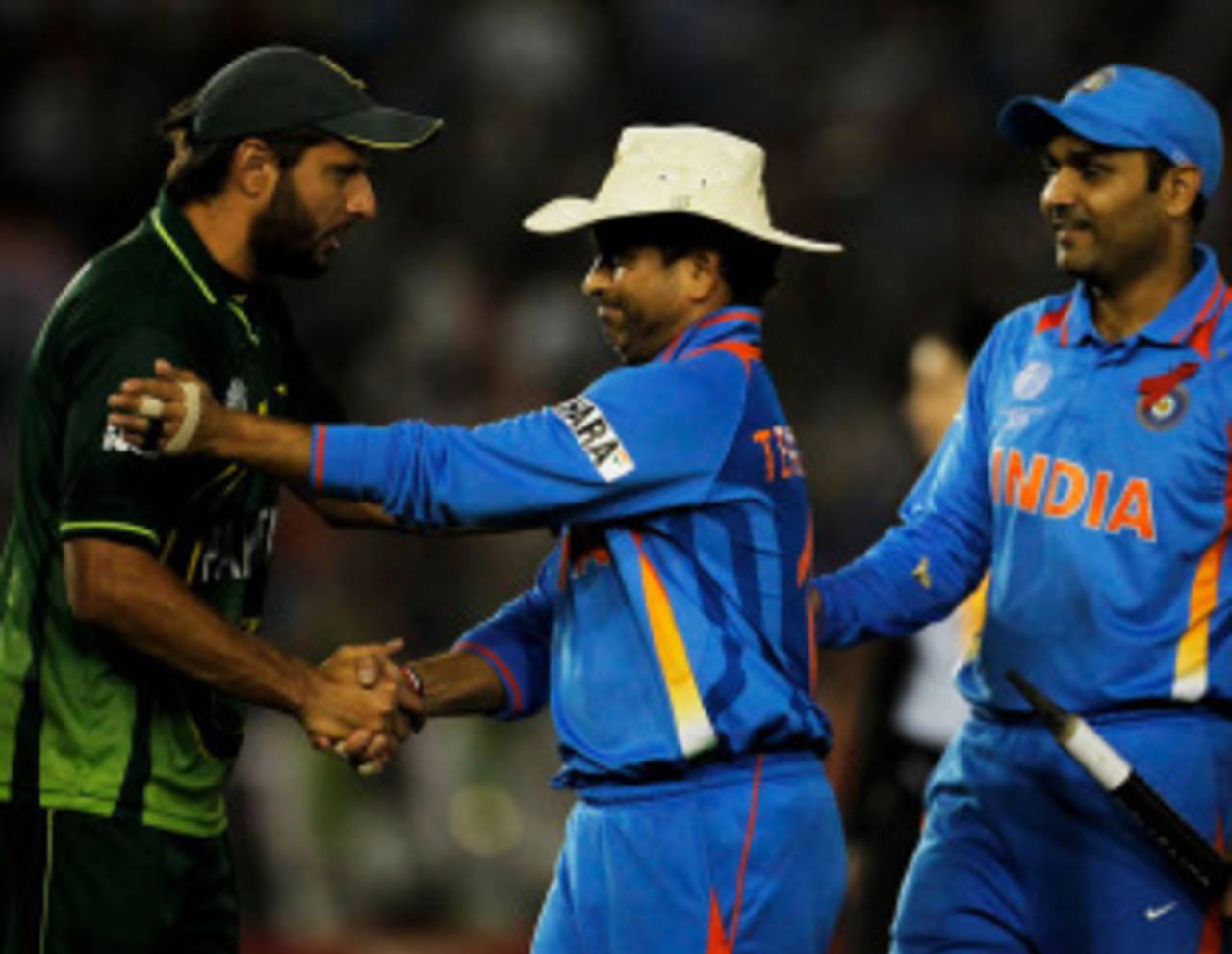Why Sachin and Shahid should let the curtain fall
What do you do when the magic dies? When eyes, slower in reaching focus, and hands and body, sluggish in finding shapes and arcs, betray you?
Kamran Abbasi
Feb 25, 2013, 11:37 PM

Ruthless self-appraisal is what the two South-Asian stars need • Getty Images
What do you do when the magic dies? When eyes, slower in reaching focus, and hands and body, sluggish in finding shapes and arcs, betray you? What do you do about your pride and honour, once spurs to glory, now flotsam battered by a surging wave of public criticism? A lucky few are able to define their success, whereas all of us are defined by our response to failure. Failure is the new success, says the wisdom of our age, making any victory sweeter and better. But when you've passed your peak each failure is a step closer to mediocrity.
We might salute Sachin Tendulkar's tenacity, his determination to defy age and grind out a performance in Calcutta. We might equally lament the passing of genius. When Ricky Ponting's cut has lost its thrust, when his mind commands dominate and his body replies abdicate, our thoughts prefer to linger on the swashbuckler once admired by enemies. For a great player, it is much harder to leave a sport than it is to enter it.
Always leave them wanting more, said Walt Disney or PT Barnum, and it is essential advice for any performer, even programmed into the genetic code of Australians. The three great Australian cricketers of the modern era, Shane Warne, Glenn McGrath and Ponting, certainly obeyed the instruction of their DNA. When you look for reasons why Australian cricket has been consistently successful, your search begins and ends here. Ruthless self-appraisal is rare in humans but Australian cricketers consider it common. On their frequent media and cricketing visits to India, they might consider adding ruthless self-appraisal to the South Asian gene pool.
Leaving them wanting more has never been popular among South Asian cricketers. Leave them wanting no more is how the giants of our game tend to retire. Kapil Dev, Wasim Akram, Javed Miandad, and now Sachin have all hung around in the middle too long, their greatness dulled by the ordinariness of their final efforts. Any sensible advisor would point Sachin to the exit door marked 'dignity preserved' for it only appears briefly before the sign changes to 'dignity lost'. This difficult England series, or a final tussle with Pakistan, are opportunities before the sign on the door is repainted. Sachin should take it.
Shahid Afridi does not intrude on any debates on greatness but he does when the conversation turns to box-office appeal. Sixteen years and counting, Afridi's razzamatazz career rolls on dividing opinion as it blazes past. At first he was a sensation, and then a hero impatient for a starring role. His next phase was most compelling: an entertainer comfortable with his repertoire, confident of which tricks to execute and which to leave in his magic box. Leg break, googly, top spinner, faster ball, rocket ball, thank you very much. Some measured hitting--now and then, even when it mattered like the 2009 T20 World Cup, Afridi's moment. How the crowd gasped when it happened.
How the crowd mutters now. Thirty runs and four wickets in his last six T20 internationals, little different in one-day internationals, Afridi is another star in need of ruthless self-appraisal. Leave them wanting more, that's how Afridi has played every innings in his career. Like Sachin and Ponting, his will to succeed lives on and is to be applauded. But like Sachin and unlike Ponting, Afridi is in danger of making the biggest mistake any star can, playing for the gallery when the magic has died.
Heart and impulse have always ruled Afridi's world. They will propel him to another joust with India this winter, another opportunity, perhaps the best possible moment, to leave them wanting more. The stage is set, the box office full, Shahid, let the curtain fall.
Kamran Abbasi is an editor, writer and broadcaster. He tweets here